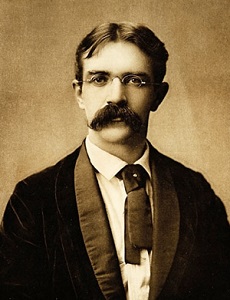De Canadese dichter en schrijver Sir Charles George Douglas Roberts werd geboren op 10 januari 1860 in Douglas / New Brunswick. Roberts groeide op in Frederictown, waar hij samen met zijn neef Bliss Carman de door George R. Parkin geleide Collegiate School bezocht. Tot 1879 studeerde hij vervolgens aan de Universiteit van New Brunswick. In deze tijd verschenen zijn eerste gedichten in het tijdschrift The Century. Hij werd directeur van de Grammar School van Chatham en publiceerde zijn eerste bundel poëzie “Orion and other Poems”. In 1890 trouwde hij met Mary Isabel Fenety, met wie hij vier kinderen kreeg. In 1882 nam hij de leiding over van de York Street School in Fredericton.Hij werkte kort voor The Week magazine in Toronto voordat in 1885 hij hoogleraar Engels, Frans en economie werd aan King’s College, Windsor, Nova Scotia. In de tien jaar dat hij er werkte verschenen hier nog twee poëziebundels (“In Divers Tones” and “Songs of Common Day”), de prozabundel “History of Canada” en verschillende verhalen. In 1890 werd hij een Fellow van de Royal Society of Canada. In 1897 scheidde Roberts van zijn familie en ging naar New York. Tussen 1907 en 1925 reisde hij door Europa en had zijn woonplaats in Londen. Hij diende tijdens de Eerste Wereldoorlog in het Britse en Canadese leger, gaf lezingen en publiceerde The Illustrated American in New York. Vanaf 1925 woonde hij in Toronto, waar hij bleef publiceren, toegewijd aan de promotie van jonge Canadese schrijvers, president van de Canadikan Authors Association werd en de Canadese “Who is Who” uitgaf. Hij, zijn neef Bliss Carman, Archibald Lampman en Duncan Campbell Scott stonden bekend als de Confederation Poets. Naast Ernest Thompson Seton wordt hij beschouwd als de belangrijkste Canadese auteur van dierenverhalen. In 1926 ontving hij de Lorne Pierce-medaille, in 1935 werd hij in de adelstand verheven.
Canadian Streams
O rivers rolling to the sea
From lands that bear the maple-tree,
How swell your voices with the strain
Of loyalty and liberty!
A holy music, heard in vain
By coward heart and sordid brain,
To whom this strenuous being seems
Naught but a greedy race for gain.
O unsung streams–not splendid themes
Ye lack to fire your patriot dreams!
Annals of glory gild your waves,
Hope freights your tides, Canadian streams!
St. Lawrence, whose wide water laves
The shores that ne’er have nourished slaves!
Swift Richelieu of lilied fame!
Niagara of glorious graves!
Thy rapids, Ottawa, proclaim
Where Daulac and his heroes came!
Thy tides, St. John, declare La Tour,
And, later, many a loyal name!
Thou inland stream, whose vales, secure
From storm, Tecumseh’s death made poor!
And thou small water, red with war,
‘Twixt Beaubassin and Beauséjour!
Dread Saguenay, where eagles soar,
What voice shall from the bastioned shore
The tale of Roberval reveal,
Or his mysterious fate deplore?
Annapolis, do thy floods yet feel
Faint memories of Champlain’s keel,
Thy pulses yet the deed repeat
Of Poutrincourt and d’Iberville?
And thou far tide, whose plains now beat
With march of myriad weathering feet,
Saskatchewan, whose virgin sod
So late Canadian blood made sweet?
Your bulwark hills, your valleys broad,
Streams where de Salaberry trod,
Where Wolfe achieved, where Brock was slain,–
Their voices are the voice of God!
O sacred waters! not in vain,
Across Canadian height and plain,
Ye sound us in triumphant tone
The summons of your high refrain.

Charles G. D. Roberts (10 januari 1860 – 26 november 1943)
